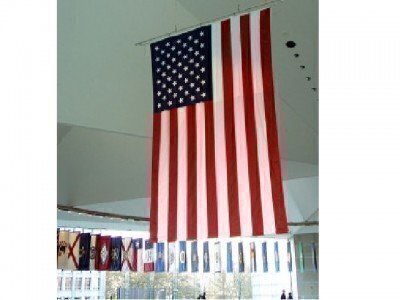On Monday morning, the United States Supreme Court refused to hear a case from California that allowed a public school to ban American flag apparel worn by students.
 Without comment, the Court denied the case of Dariano v. Morgan Hills School District. At least four of the nine Justices were needed to get the case before the Court next year for arguments.
Without comment, the Court denied the case of Dariano v. Morgan Hills School District. At least four of the nine Justices were needed to get the case before the Court next year for arguments.
The move seemingly upholds a precedent set in the late 1960s in the Tinker decision that school officials can censor student passive free speech if they feel the speech disrupts school activities.
On Friday, the Justices met in private to consider the case, which references several prominent First Amendment issues and reflects on the changing demographics in 21st Century America.
The controversy goes back to a May 2009 incident between two groups of students at Live Oak High School. At a school-sponsored Cinco de Mayo event, a Mexican-American student walked around campus with the flag of Mexico and other students flew a makeshift United States flag in response and chanted at the flag-bearing student. Students on both sides complained about the incident.
A year later, several students came to school on Cinco de Mayo wearing American flag shirts and school officials told the students to remove the American flag shirts, or turn the shirts inside out. The educators said the American flag shirts could send a message that would offend the Cinco de Mayo celebrants and they had public safety concerns.
The parents of the American flag-wearing students sued on their behalf, alleging First Amendment violations by the Morgan Hill School District.
The federal Ninth Circuit Court ruled in favor of Morgan Hill School District. The lower courts said that the educators' American flag apparel ban didn’t violate a standard set in the famous Tinker case.
In the Tinker v. Des Moines case of 1969, the Supreme Court said that students “don’t shed their constitutional rights to freedom of speech or expression at the schoolhouse gate.” The Court also said in Tinker that educators can take censorship action against students if “students’ activities would materially and substantially disrupt the work and discipline of the school.”
In this new case, the lawyers for the students claim the Ninth Circuit is trying to change this definition, by restricting passive First Amendment speech. And in fact, the student’s attorneys say the Court should make it clear that American flag displays of any type shouldn’t be banned at public schools.
“There is never a legitimate basis for banning the display of an American flag on an American public school campus. And by incentivizing and rewarding violence as a legitimate response to unpopular speech, the Ninth Circuit’s decision is contrary to our foundational First Amendment principles and provides a dangerous lesson in civics to our public school students,” they claim.
Morgan Hill’s lawyers say the teachers made the correct decisions based on the rule established in the Tinker case.
“School officials on the scene had ample reason to believe violence and disruption were about to happen. School officials across the Nation act against a backdrop of the need to prevent another Santee, Columbine, Littleton, or any of the hundreds of school shootings that have happened since Tinker was decided,” the Morgan Hill lawyers argue.
They also believe the case isn’t a referendum on flying the American flag at public schools.
“This categorical statement misstates the nature of this case, and misreads the Constitutional issues involved,” the Morgan Hill lawyers argue. “According to Petitioners, the ordinary deference paid to school regulation of student dress and expression should disappear whenever the flag is involved – even, here, when there is no flag involved, but clothing with a flag ’theme.’ There is no Constitutional basis for such a distinction, especially in the context of safety at schools.”
Two people who also wanted the case decided by the Supreme Court are Mary Beth and John Tinker, the petitioners in the 1969 free speech case.
“It is ironic that the student expression censured in this case involved a showing of respect for the American flag,” the Tinkers said in their court brief. They fear that a ruling in favor of the school would send “a message that is the very antithesis of the First Amendment: that speech can be effectively suppressed by threat of violence.”
Scott Bomboy is the editor in chief of the National Constitution Center.







